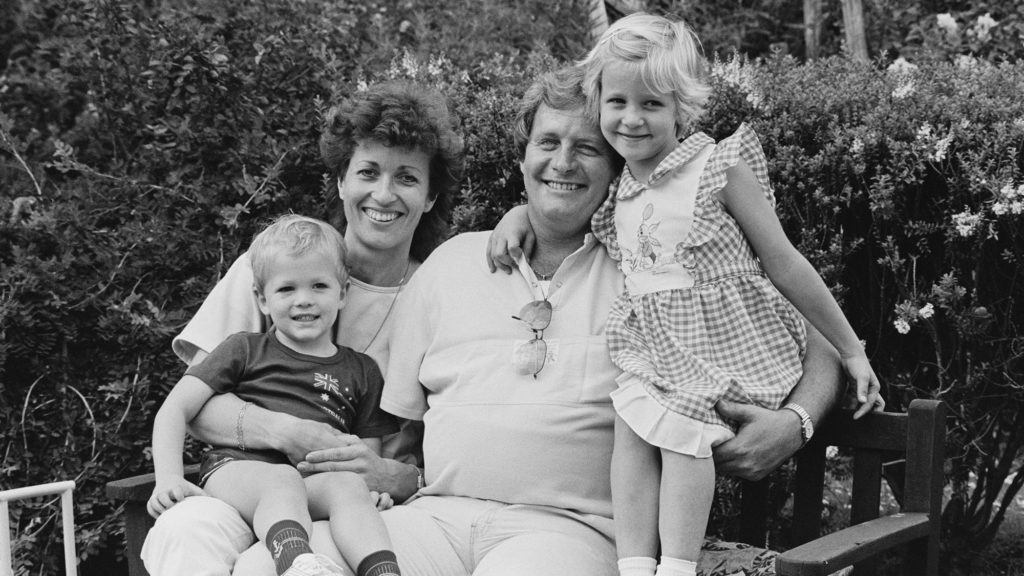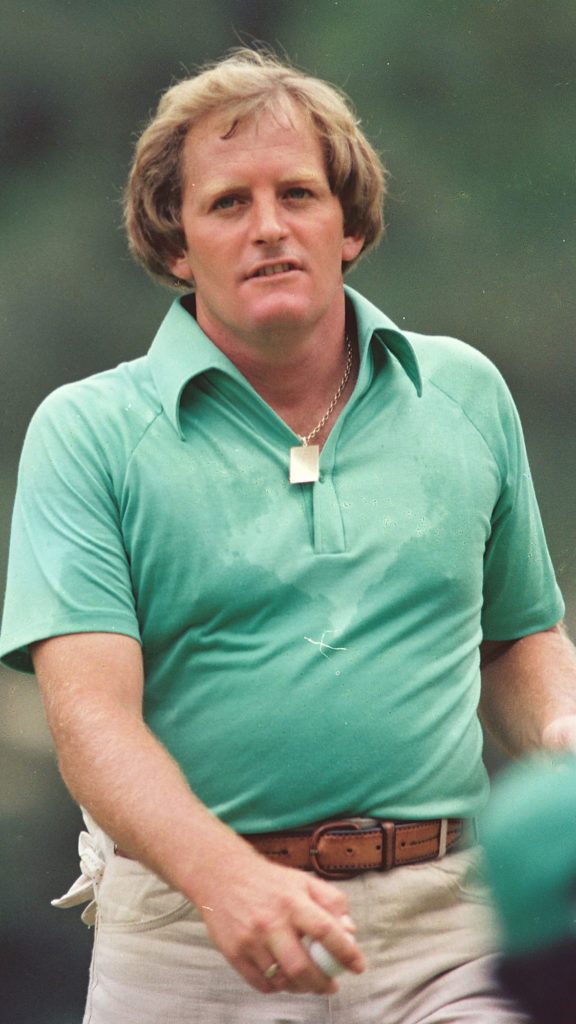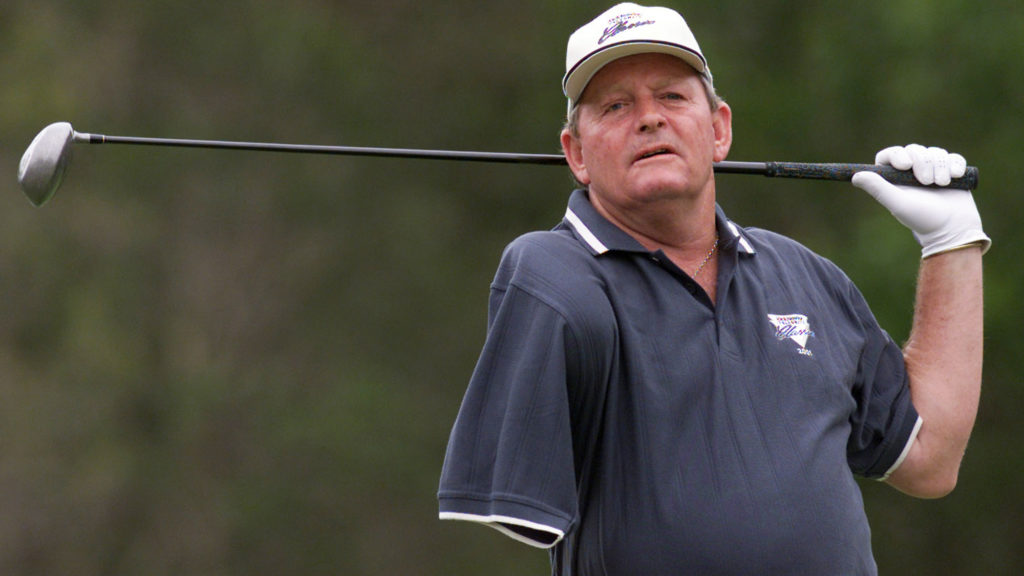Genuine characters in golf are rare, and rarer still are characters with substance to match the panache. The death of Jack Newton in April meant the passing of a true legend of Australian golf.
Feature image by Australian Golf Digest archives

Australian golf lost one of its great characters with the recent passing of Jack Newton. Larger than life as a tour player, Newton battled Alzheimer’s disease in his later years and eventually succumbed to health complications at the age of 72.
Born in Cessnock, Newton turned professional in 1969 after a distinguished amateur career. He won 13 professional tournaments, including three on the European Tour, a PGA Tour title in 1978 and the 1979 Australian Open at Metropolitan. Twice a runner-up in Majors, Newton lost an epic playoff for the 1975 Open Championship to Tom Watson at Carnoustie over 18 extra holes (71-72). At the 1980 Masters at Augusta, he pushed Seve Ballesteros all the way to the finish, falling four shots shy.
A near-fatal accident at Sydney Airport in 1983 ended Newton’s playing career prematurely at the age of 33. Newton is universally admired for how he dealt with that aeroplane-propeller accident from which he lost his right arm and right eye as well as suffering severe abdominal injuries.
Newton reinvented himself as the doyen of golf commentators, a staunch advocate for junior golf and as a charitable fundraiser, most notably for diabetes. He would also serve as chairman for the PGA Tour of Australasia and was an accomplished golf course architect. Newton was inducted into the Sport Australia Hall of Fame in 2016 for his contribution to golf.
For more than two decades, Newton was the voice of Australian golf on the Seven Network’s summer coverage of men’s golf. The Australian Open, PGA and Masters were all the better for his authoritative opinions. He took the view that many commentators were boring and most were too technical for the average viewer. Newton wanted commentary to be fun so he would try to impart nuggets of advice. As a former tour player, Newton was mindful of being too critical of current players and hated the ‘choker’ tag being applied to a golfer. He would also pay homage to advice once given to him by cricket broadcaster Richie Benaud on how to commentate live sport on TV: the viewer can see what you can see so don’t say anything unless you’ve got something intelligent to add to it.
Newton was offered the chance to commentate on the PGA Tour. But it meant being on the road 32 weeks a year in America and that didn’t interest a man who treasured his time at home in the Newcastle suburb of Cardiff.
Newton’s greatest legacy will be his influence upon junior golf. By and large, juniors were regarded as something that should be seen and not heard at Australian golf clubs in the early 1980s. Newton changed that perception over the next four decades. Through his junior golf foundation, he promoted golf for children under 18 years of age. Tournaments hosted by Jack Newton Junior Golf were a celebration of youth. As a result, leading golf clubs opened their doors and began to welcome junior tournaments more frequently.
Many professional careers were launched off the back of Jack Newton Junior Golf. Yet the foundation played an equally important role by providing graduates with confidence, leadership qualities and general life skills. For as Jack said on many occasions, golf plays a part in getting kids off the streets. It teaches rules, etiquette and discipline. He was constantly surprised by the number of people who told him they wished they’d taken up the sport earlier in life.

JACK AND AUSTRALIAN GOLF DIGEST
Newton had a lengthy relationship with Australian Golf Digest that emanated from his friendship with long-time editor Phil Tresidder. From hosting our annual Player Of The Year Awards to writing insightful columns, Newton was a regular presence with the magazine.
We were fortunate enough to be closely tied to Jack’s two annual fundraising initiatives: the Jack Newton Corporate Cup and Jack Newton Celebrity Classic. At the former, we’d play in various legs of the corporate event and attend the black-tie dinner later in the evening. It was likewise with the three-day bonanza known as ‘The Jack’ held the week before Christmas, where one Digest staffer usually attended.
Familiar faces gathered each year at both events, a kind of extended family of the Newtons – the type where you may not have seen or heard from other attendees in the 12 months prior. But that lapsed time would evaporate across a table with a beverage in hand amid an environment of fun and festivity. There’s no question some regulars simply wanted to attach themselves to recognisable celebrities. But the vast majority kept coming back because they just liked the man and enjoyed his company and that of the people he mixed with.
Jack Newton had that effect on people – all while overcoming adversity to accomplish simple daily tasks we take for granted. Try brushing your teeth with your non-dominant hand. That Newton taught himself to play golf again – attaining a 12-handicap – is a testament to his perseverance.
That enormity of what he faced was evident during one long luncheon we shared with Jack at Beppi’s Italian restaurant at Darlinghurst in Sydney. Jack was in fine form, regaling all sorts of tales. Come the main course, a waiter brought out a bowl of spaghetti and tied a bib around his neck. It was awkward watching a grown man attempt the tricky task of loading spaghetti strands onto a fork with one arm. Upon leaving the restaurant I remarked, “Jack only ate half his meal.” To which former Australian Golf Digest editor Michael Court replied: “I think he just got tired.”
Back when he first began writing columns for Digest, Newton would assemble his thoughts with pen and paper, having taught himself to write left-handed. Wife Jackie would fax the column to Digest’s Sydney office in Alexandria where it would be typed and sub-edited into a publishable format.
What was clear from those early columns was Newton’s clarity of thought, sensible construction and rich vocabulary. Nevertheless, it was obvious a more practical method could produce columns more frequently and lessen the burden on Jack.
Tasked with ‘ghosting’ columns for Newton, it began a journey I will fondly cherish. During interviews in person or over the telephone, Jack was erudite and forthright, and no subject was off limits.
His columns were insightful for an Australian perspective on a world of golf where the PGA Tour reigned supreme. A frequent lament was Tim Finchem and the PGA Tour showing a lack of interest in developing golf outside the US, particularly Australia. In that regard, Jack used to chasten American pros for their reluctance to play tournament golf outside the US.
Jack was a bellwether for Australian golf. He deplored the bane of slow play and said it was outrageous that on weekends, at courses across Australia, it’s regularly taking more than five hours to play a round of golf. He pointed the finger at professional golf, in particular the American PGA Tour, which he believed had failed dismally at dealing with slow-play issues. Rather than a financial penalty, Newton believed a two-stroke penalty or the threat of suspension would smarten up slow-play offenders.
Golf in club land was a source of exasperation. Before it was fashionable, Newton implored golf clubs to be more inclusive and welcoming “to accommodate modern attitudes and lifestyles”, especially with regard to juniors. There weren’t enough young people sitting on boards to help make decisions, Newton wrote in a 2011 column. “Many of the ones that do get elected are then driven off by old bludgers who spend two and sixpence at the club.” In the same column, he took aim at bullying towards girls by older female members, wealthy clubs that don’t do a thing for juniors, and how archaic dress regulations and “the sticklers who police that sort of stuff are driving people away from the game”.
Newton would always go into bat for Australian golf. Amid the ‘Golf is boring’ debate circa 2006, Newton accused the daily print media – specifically News Limited and Fairfax – of not doing enough to promote golf in Australia. “Amateur golf is virtually ignored in the daily media, let along junior golf,” he wrote. Citing extensive newspaper coverage of AFL, NRL and English soccer compared to the lack of coverage for Australia’s No.1 participation sport, Newton added: ‘The daily print media aren’t publishing editorial that is commensurate with what is happening in the game.” Newton’s solution was for leaders of the game here to address the issue by speaking directly with the major media organisations.
That being said, Newton bemoaned the fragmented approach and inherent inefficiencies in Australian golf with up to 30 organisations administering the game. In his 2004 column titled ‘Who Should Run Australian Golf?’ Newton argued there was a case for golf administration to be centralised. He cited how difficult it was for golf to receive government funding when it had so many bodies seeking handouts: Australian Golf Union, Women’s Golf Australia, 12 state associations, four junior foundations, PGA Tour of Australasia, PGA of Australia and its various state bodies, and Australian Ladies Professional Golf.
Newton proposed amalgamating the PGA and PGA Tour, the merger of amateur golf bodies to form ‘Golf Australia’ and the creation of a centralised hub, preferably at Sydney Olympic Park but conceding “perhaps Melbourne should be a headquarter for golf in Australia”.
Eighteen years later and Newton’s wishes have all come to fruition. The merger of the AGU and WGA saw the creation of Golf Australia, which now shares office space with the amalgamated PGA of Australia at the new Australian Golf Centre at Sandringham Golf Links in Melbourne. Meanwhile, club membership is on the rise and golf is not as disadvantaged from a government-funding perspective as it’s now an Olympic sport.
Jack didn’t mince words in his columns, nor did he fawn over the game’s best players. He expressed being slightly disappointed by the achievements of Adam Scott in a 2011 column, which was published just months after the Queenslander tied for second at the Masters. Having previously been an outspoken critic of Scott’s putting, Newton said he had a technically better swing than Jack Nicklaus, Greg Norman and Tiger Woods “but he lacked a killer instinct to be dominant”. Newton went on to praise the addition of Kiwi caddie Steve Williams, saying: “I had a feeling Williams might provide some of that mongrel that Scott needed to harness, rather than just muddling along”. Some 18 months later Scott became the first Australian to win the Masters with Williams on the bag. Once again, Jack was vindicated.

Newton was one of the few commentators who found shortcomings in Tiger Woods’ game. He built a sound argument Tiger shouldn’t be declared golf’s greatest player unless he bettered Nicklaus’ record of 18 Major titles. And he saw things differently to most pundits who would wax lyrical about how Tiger overcame racial barriers to succeed in a predominantly white man’s sport. Newton pointed out that Tiger had quite a “pampered” upbringing by virtue of the unconditional assistance provided by his late father Earl Woods.
Jack would always stick to his guns. In one of his most controversial AGD columns, Jack hammered the Australian Golf Union (now Golf Australia) and its executive director Colin Phillips – basically accusing them of negligence for failing to increase prizemoney at the men’s Australian Open. His insinuation that Phillips didn’t like golf professionals prompted the threat of legal action from the AGU’s lawyers. Without hard evidence of Phillips uttering such a statement, we published a retraction. However, we made the decision not to tell Jack in advance of the retraction and his subsequent spray left my ear ringing for days.
But Jack never bore a grudge. He was a man’s man who said what needed to be said without fear or favour. He will always be a great friend of this magazine.
Jack Newton transcended the game of golf. His legacy will live on through his wife Jackie, son Clint, daughter Kristie, and grandchildren Matilda, Hope, Jessie, Noah, Paige and Indie.



